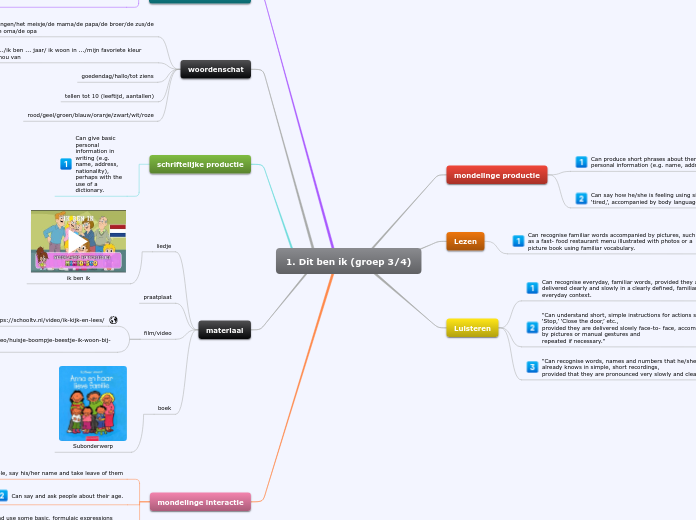1. Dit ben ik (groep 3/4)
Use this mind map to plan and easily organize your lessons.
mondelinge interactie
Homework improves student achievement and teaches students to work independently.
Provide your students with feedback on their homework, as this is an essential instrument allowing you to enhance the significance of assignments in their overall academic life.
Can understand and use some basic, formulaic expressions such as ‘Yes,’ ‘No,’ ‘Excuse me,’ ‘Please,’ ‘Thank you,’ ‘No thank you,’ ‘Sorry.’
I can apologise. I can say thank you.
Can say and ask people about their age.
Can greet people, say his/her name and take leave of them
I can ask someone’s name, and I can say my name.
materiaal
boek
Subonderwerp
film/video
https://schooltv.nl/video/huisje-boompje-beestje-ik-woon-bij-mama/#q=familie
https://schooltv.nl/video/ik-kijk-en-lees/
praatplaat
liedje
ik ben ik
schriftelijke productie
An actual experience with discussions will help students grasp the connections between different topics. Students will have the chance to use their knowledge gathered in class or during the personal researches and be able to participate effectively in the discussion as group members.
Can give basic personal information in writing (e.g. name, address, nationality), perhaps with the use of a dictionary.
woordenschat
rood/geel/groen/blauw/oranje/zwart/wit/roze
tellen tot 10 (leeftijd, aantallen)
goedendag/hallo/tot ziens
ik ben .../ik ben ... jaar/ ik woon in .../mijn favoriete kleur is.../ik hou van
ik/de jongen/het meisje/de mama/de papa/de broer/de zus/de baby/de oma/de opa
schriftelijke interactie
More and more teachers are using visual aids and other helping tools to exemplify lessons.
Can write short phrases to give basic information (e.g. name, address, family) on a form or in a note, with the use of a dictionary.
I can fill in a simple form (name, address, age)
Luisteren
Establish your goals.
What do you want your students to achieve?
"Can recognise words, names and numbers that he/she already knows in simple, short recordings,
provided that they are pronounced very slowly and clearly."
Ik kan getallen tot 10 herkennen in een korte zin (leeftijd, aantallen)
"Can understand short, simple instructions for actions such as ‘Stop,’ ‘Close the door,’ etc.,
provided they are delivered slowly face-to- face, accompanied by pictures or manual gestures and
repeated if necessary."
ik kan eenvoudige opdrachten uitvoeren (TPR)
Can recognise everyday, familiar words, provided they are delivered clearly and slowly in a clearly defined, familiar, everyday context.
Lezen
Can recognise familiar words accompanied by pictures, such as a fast- food restaurant menu illustrated with photos or a picture book using familiar vocabulary.
ik kan woorden herkennen in een woordzoeker
ik kan woorden herkennen in een (digitaal) woordspelletje (memory)
mondelinge productie
Can say how he/she is feeling using simple words like ‘happy,’ ‘tired,’, accompanied by body language.
Ik kan zeggen hoe ik me voel: ik ben blij, ik ben boos, ik ben moe
Can produce short phrases about themselves, giving basic personal information (e.g. name, address, family, nationality).
ik kan tot 10 tellen
Ik kan mijn naam, woonplaats, familie en leeftijd noemen

